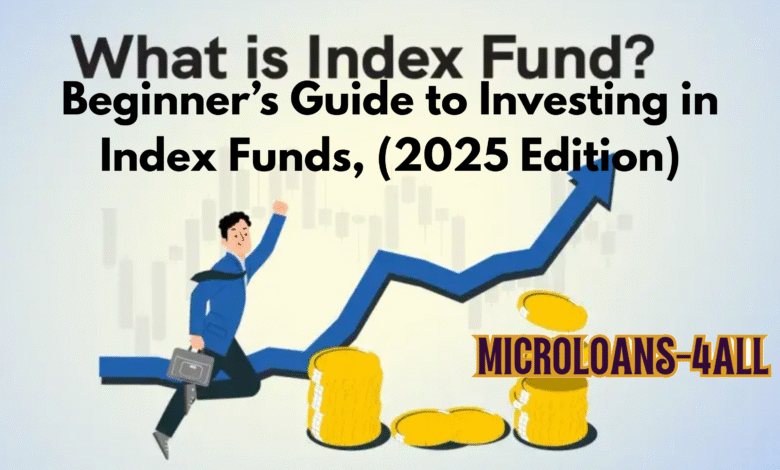
Beginner’s Guide to Investing in Index Funds, (2025 Edition)
Hello, friends. Welcome to our blog. My name is Max, and if this is your first time visiting our blog, please bookmark it, as we will continually share articles that benefit you and your business. Be sure to visit our blog periodically for important articles, such as the one we’re about to share with you now.
If you are new to investing and seek a straightforward, cost-effective strategy for growing your capital over time, index funds can prove to be a transformative option. Their blend of diversification, ease of management, and historically robust returns makes them a preferred choice among both novice and experienced investors.
Understanding Index Funds
An index fund represents a type of investment vehicle that accurately tracks a designated market index, such as the S&P 500, FTSE 100, or NASDAQ-100. Rather than attempting to outperform the market by selecting individual stocks, index funds focus on replicating the performance of the broader market segment they are designed to follow.
Investors can access index funds via mutual funds or exchange-traded funds (ETFs).

The Benefits of Index Funds for New Investors
- Diversification
One of the standout features of index funds is their ability to spread your investment across a wide range of companies—sometimes even into the hundreds. This natural diversification helps reduce risk, so your returns aren’t tied solely to the performance of one stock. It’s like having a basket full of different fruits rather than putting all your eggs in one basket.
Beginner’s Guide to Investing in Index Funds, (2025 Edition)
-
Low Costs
Thanks to their passive management approach, index funds usually come with lower fees. This means more of your hard-earned money stays invested and working for you over time, rather than being eaten up by high management charges.
- Consistent Performance
Looking at historical data, it’s clear that most actively managed funds find it tough to beat the market when you factor in fees. On the flip side, index funds aim to mirror market performance, which has shown steady growth over the long haul. So, you can rest easy knowing you’re in for a ride that’s generally on the upward trend.
- Simplicity
Investing in index funds is refreshingly straightforward. You don’t need to be a financial expert or spend hours analyzing individual stocks. Just pick a broad market index and make regular investments. This simplicity makes it easier for anyone to start their investment journey without feeling overwhelmed.
Beginner’s Guide to Investing in Index Funds, (2025 Edition)
Popular Types of Index Funds
1. Broad Market Index Funds: These funds serve as an effective means to access the broader stock market. Designed to replicate the performance of significant market segments, they include options such as the S&P 500, which encompasses many prominent U.S. companies, or the Whole Stock Market Index for a more comprehensive investment approach.
2. International Index Funds: If you’ve ever wanted to spread your wings beyond your home country, these funds are a great way to do it. They focus on giving you a taste of global markets, helping you diversify your investments on an international level.
3. Bond Index Funds: For those who prefer a steadier ride, these funds track a mix of government and corporate bonds. They can be a more stable option for investors looking to balance their portfolios.
4. Sector Index Funds If you have a keen eye for certain industries, like technology, healthcare, or energy, sector index funds could be your go-to. They enable you to tap into specific economic sectors and capitalize on industry trends.

How to Create a Monthly Budget (Step-by-Step for Beginners)
The Best Index Funds and How to Start Investing
Beginner’s Guide to Investing in Index Funds, (2025 Edition)
How to Start Investing in Index Funds
- Choose Your Brokerage or Platform
Open an account with a reputable investment platform or bank. Popular choices include Vanguard, Fidelity, Schwab, and in the UK, platforms like Hargreaves Lansdown or AJ Bell.
- Pick Your Index Fund
Decide which index you want to track. Beginners often start with the S&P 500 or a Total Market Index Fund for broad exposure.
- Check Fees (Expense Ratio)
Look for expense ratios under 0.20%. Even small differences in fees can have a big impact over decades.
- Set an Investment Schedule
Use dollar-cost averaging (or pound-cost averaging in the UK) by investing a fixed amount regularly, monthly or quarterly, regardless of market ups and downs.
- Stay the Course
Markets will rise and fall, but index fund investing is most powerful when you stay invested for the long term.
Common Mistakes to Avoid
-
Trying to Time the Market
Waiting for the “perfect time” often means missing the best days. -
Overcomplicating Your Portfolio
One or two diversified index funds can be enough for most beginners. -
Ignoring Fees
Even low-cost funds can differ; always check the expense ratio. -
Selling During Market Dips
Market downturns are normal. Selling in panic locks in losses.
Beginner’s Guide to Investing in Index Funds, (2025 Edition)
How Much Can You Earn?
While past performance doesn’t guarantee future results, the S&P 500 has historically returned about 7–10% annually after inflation over long periods. Investing consistently, reinvesting dividends, and allowing your money to compound can significantly grow your wealth over decades.
Example:
If you invest $300 per month at an average 8% annual return for 30 years, you could end up with over $400,000, and more than half would come from investment growth, not your contributions.
Index funds are one of the most beginner-friendly investments out there. With low fees, broad diversification, and long-term growth potential, they take the complexity out of investing.
Whether you’re saving for retirement, a home, or just building wealth, starting with a simple index fund strategy can put you on a strong financial path. Remember: the key is consistency, patience, and letting your money work for you over time.



